Rynus offers a powerful and comprehensive suite of features designed to redefine decentralized AI Infrastructure, empowering users with advanced tools and unmatched capabilities.
Decentralized AI Infrastructure Network
Rynus is a decentralized AI infrastructure network designed to support AI Training and Data Labeling. It connects users with computing demands to a global pool of idle resources, creating a scalable, efficient, and cost-effective platform for AI development.
For AI Training, Rynus bridges the gap between Requesters requiring high-performance GPU computing power and individuals or organizations with idle GPUs. This connection ensures that resource demands are met efficiently and cost-effectively.
Similarly, for Data Labeling, Rynus harnesses the power of millions of idle devices—including mobile phones, tablets, and PCs—to perform labeling tasks, enabling unparalleled scalability and accessibility.
Comprehensive AI Services
Rynus provides end-to-end AI services, supporting the entire AI lifecycle within a single, unified platform. From Data Labeling to AI Training, Rynus combines the strengths of multiple competitors into one comprehensive solution, streamlining the AI development process for Requesters.
But Rynus is more than just an AI platform – AI is only the beginning. Our vision extends to integrating diverse industries and applications into our DePIN platform. In the future, Rynus aims to support a wide array of services, including storage, gaming, automobile, metaverse, and more.
First-ever on-chain Data Labeling
Rynus introduces the first-ever on-chain data labeling solution, transforming the traditional data labeling process by enhancing transparency, security, and accessibility. This enables Rynus to offer a decentralized and efficient platform for data preparation – the first step in the AI/Machine Learning Pipeline.
- Multiple Labeling Services: Rynus supports a wide range of data labeling tasks, including Image Labeling, Text Labeling, Audio Labeling, and Video Labeling. This allows AI/ML developers to prepare data across multiple formats, ensuring high-quality inputs for various machine learning applications.
- Cross-Device Labeling Workforce: To make data labeling accessible and scalable, Rynus leverages a decentralized workforce that can label data from any device—mobile phones, tablets, PCs, and laptops—maximizing participation and ensuring flexibility for Workers. This flexibility expands the workforce pool, allowing Rynus to handle large-scale data labeling projects with ease.
- Convenient Access via Telegram Mini App: Rynus uses a Telegram Mini App to manage and distribute labeling tasks, making it easy for Workers to engage with the platform from any location. With Telegram Mini App, labeling tasks are accessible, streamlined, and completed efficiently, with Workers participating through simple tap-to-earn or listen-to-earn activities.

ZKP and State Compression
Rynus leverages Zero-Knowledge Proof (ZKP) and State Compression technologies to address the challenges of managing and storing vast amounts of data in a decentralized network for AI Model Training and Data Labeling. These are key to minimizing on-chain storage costs while maintaining security, transparency, and efficiency.
Big Data Challenge

Rynus network handles massive datasets and coordinates millions of decentralized Workers globally:
- Data Labeling: A single job may include millions of images requiring accurate annotation.
- AI Model Training: Training a computer vision model can require datasets of over 1,000,000 images.
With each image, item, frame, and Worker signals and information that needs to be recorded, the challenge lies in storing these proofs on-chain without incurring prohibitively high fees.
State Compression
Rynus applies State Compression to drastically reduce on-chain storage costs. State compression uses “tree” structures to cryptographically hash off-chain data, in a deterministic way, into a single final root hash, which is then stored on-chain. The root hash acts as a verifiable proof for all data within the tree, enabling Rynus to cryptographically verify off-chain data without storing the full dataset on-chain.
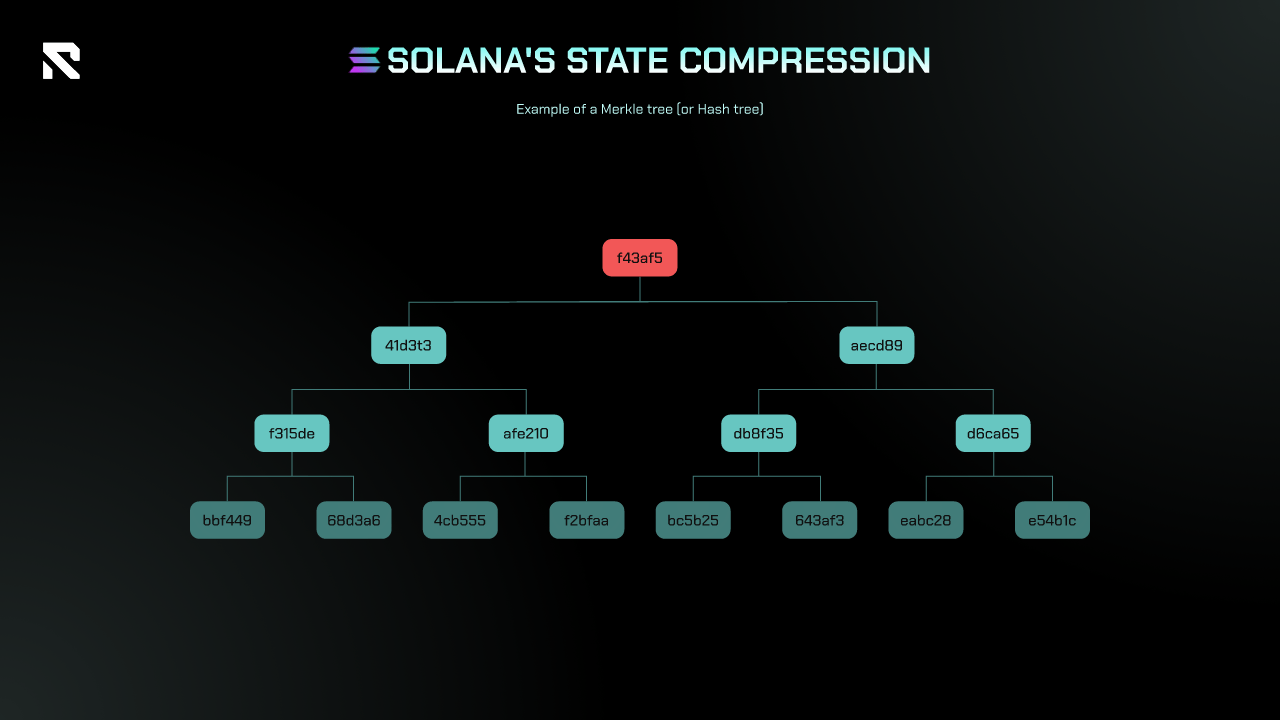
Benefits: This method reduces the size of on-chain storage while maintaining the integrity and verifiability of the data. Therefore, significantly lowers the costs associated with storing and proving large datasets, enabling scalable solutions for big data tasks.
Zero-Knowledge Proof
Rynus integrates Zero-Knowledge Proof technology, particularly in its Data Labeling service, to ensure secure data processing and reliable consensus mechanisms.
ZK Proof enables Rynus to process data securely without disclosing sensitive details. For example, in Data Labeling, an image is sent to multiple annotators. If 51% of consensus annotators with high credit scores provide the same label, it is considered the correct result.
Benefits:
- Guarantees data security and privacy by avoiding unnecessary disclosure of details.
- Ensures labeling accuracy through a decentralized consensus mechanism while reducing vulnerabilities.
By combining State Compression for cost-efficient on-chain storage and Zero-Knowledge Proof for secure data processing, Rynus delivers a scalable, decentralized solution for big data tasks like Data Labeling and AI Training.
Big Data Transfer
The seamless transfer of big data poses a critical challenge for any decentralized and centralized systems. Particularly in today’s landscape, big data plays an increasingly vital role in AI training and machine learning. The quantity and quality of data directly impact the learning and pattern recognition capabilities of AI systems.
With the rapid advancement of technology, AI models have evolved significantly, resulting in minimal differences among them. In some cases, even tools like ChatGPT can assist in creating a training model. Consequently, the quality of input data is now the critical factor in determining training outcomes. Training involves a model learning from data—the more data available, the more the model can learn, leading to greater accuracy. This underscores the critical importance of big data in AI. Efficient big data transfer is essential and foundational for any AI training service.
When utilizing a third-party AI training service or platform instead of training locally, an excellent data transfer tool becomes indispensable. Without the capability to transfer data effectively, neither the service/platform nor the AI model will function properly. Big data transfer is a significant concern for all cloud computing service providers, each employing various tools and protocols for file transfer.
At Rynus, we have developed our proprietary protocol with six standout features to address the complexities of big data transfer. Rynus has also introduced its own desktop app as a specialized data transfer tool, designed to offer superior performance compared to other available tools.
1. File Splitting
Rynus Network intelligently determines the optimal segmentation of files based on the client’s network conditions. For instance, for a 1 GB file, Rynus may initially divide it into smaller, more manageable parts of 100 KB. As the client’s network improves, Rynus adjusts dynamically, potentially dividing the file into larger segments, such as 300 KB.
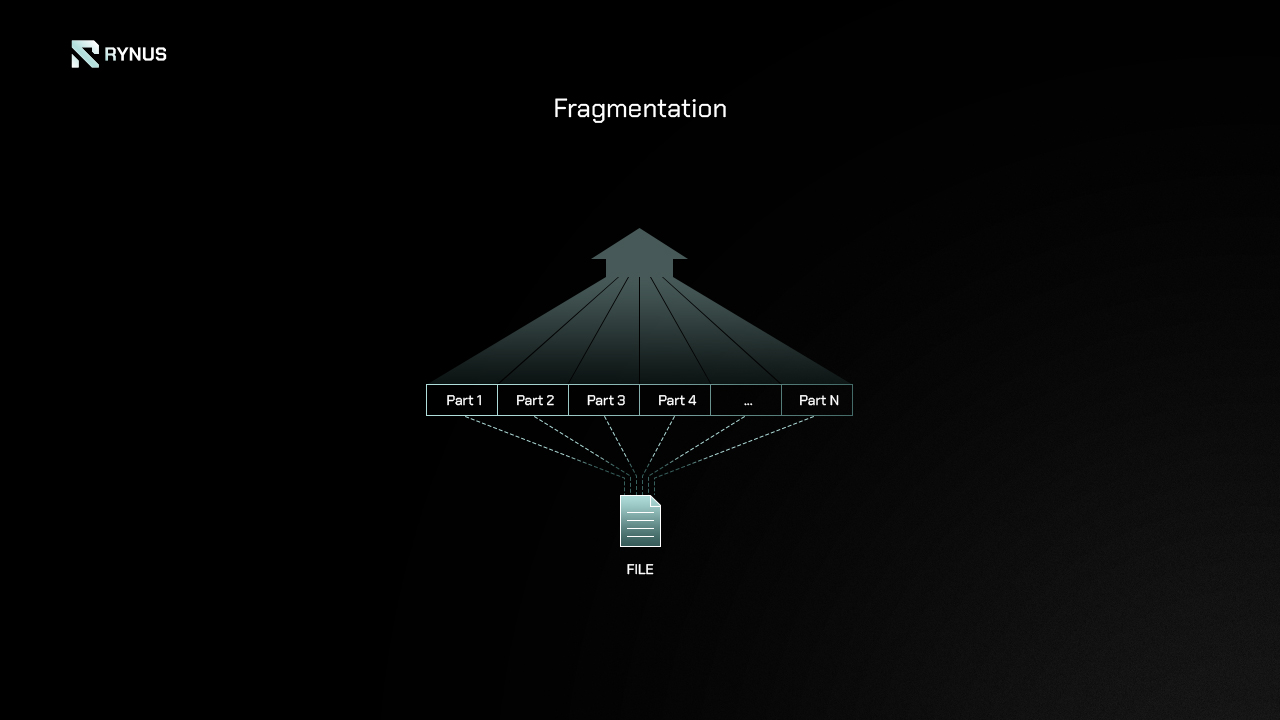
Another reason behind this feature is to maximize bandwidth usage efficiently. Whether the available bandwidth is high or low, Rynus ensures that file segments are transferred using the full bandwidth capacity.

2. File Compressing
Uploading a folder with 1000 files totaling 1 GB can be time-consuming compared to a single 1 GB file. Hence, Rynus employs compression techniques aligned with our standards. This process compresses the files before segmenting and transferring them, ensuring fast upload speeds.
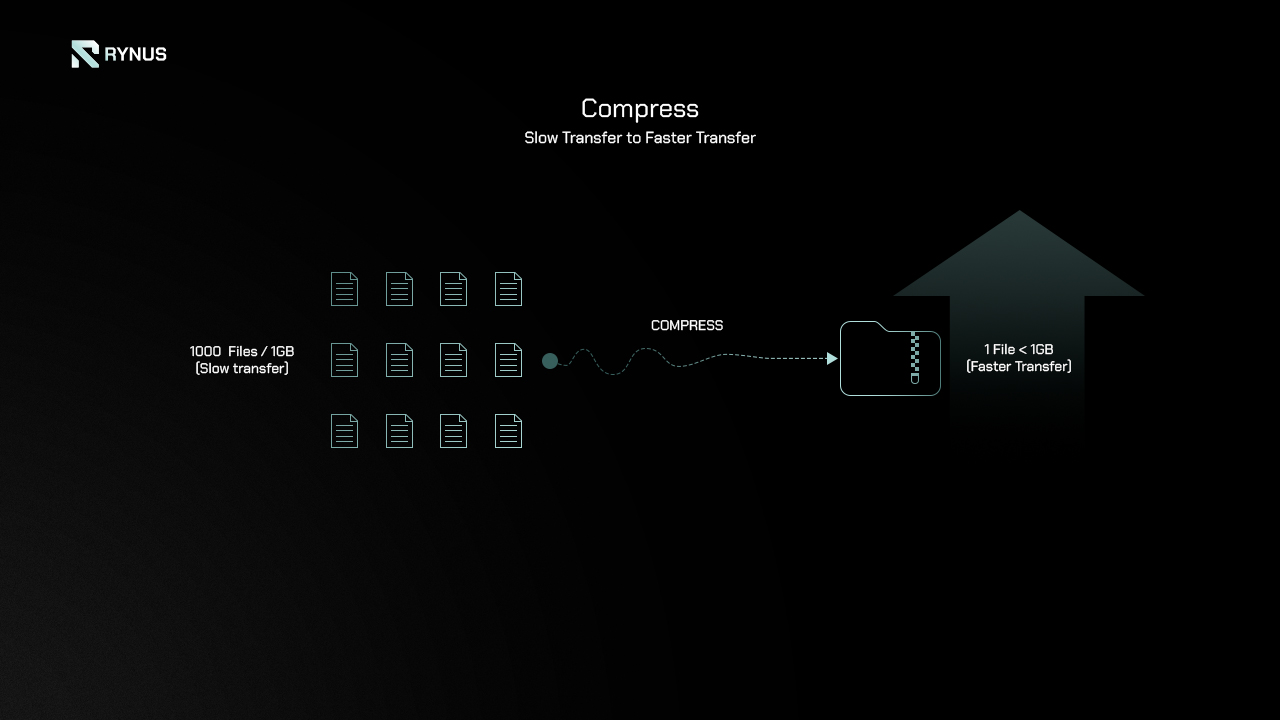
3. Pause/Resume Functionality
Consider a case where a client has uploaded 80% of 1 TB data but encounters a network interruption. Upon reconnection, the client does not need to restart the upload from scratch. Instead, they can seamlessly resume from the point of interruption, uploading only the remaining 20%. Additionally, users can pause and resume uploads at their convenience, facilitated by Rynus’s file numbering system that tracks and manages pieces of uploaded files.
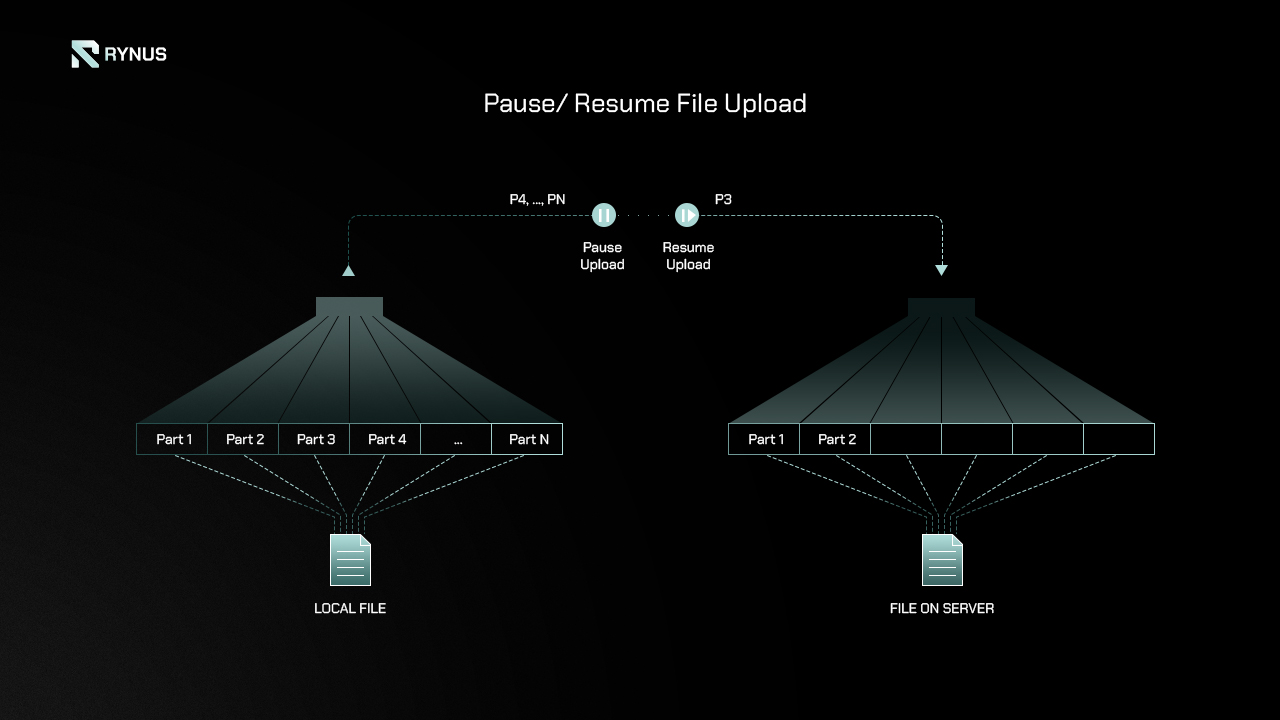
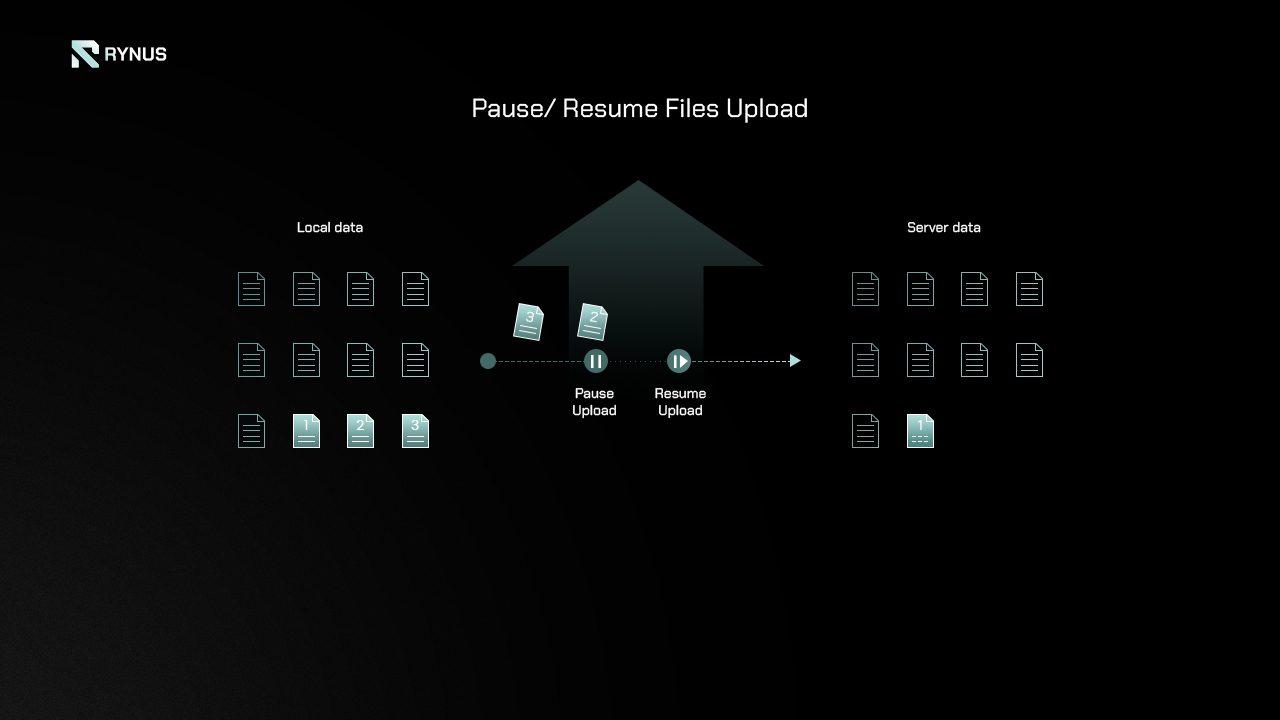
4. Selective File Upload
Modifications may be necessary during the course of project work. Rather than re-uploading an entire folder containing numerous files, Rynus identifies and uploads only the files that have been updated. This efficient approach avoids redundant uploads of unchanged files.
These four points allow Rynus’s solution to adapt dynamically to varying network conditions and ensure efficient file transfers. Furthermore, to optimize the process and minimize time, Rynus leverages the following approach.
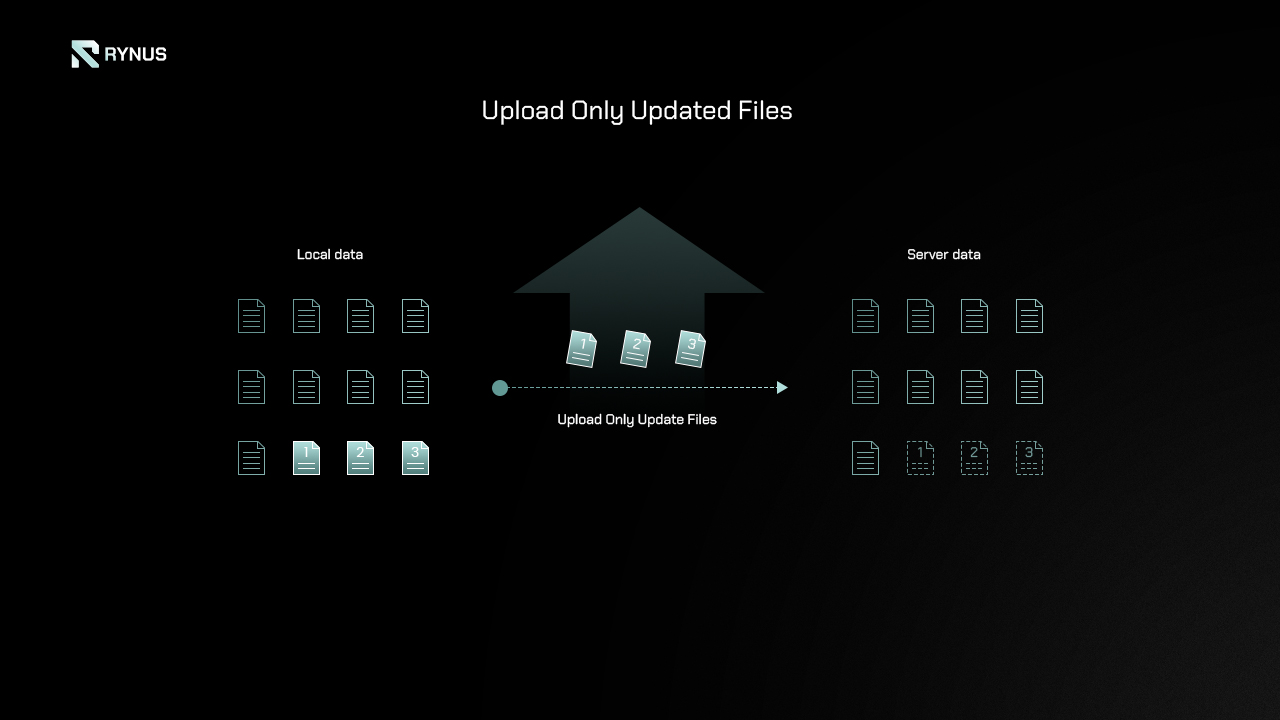
5. Optimal File Routes
When transferring client data, Rynus does not rely on a single path from A to B. Instead, we explore multiple routes through different network nodes. Rynus tests various routes by sending “seed files” – small, 1 KB pieces through each route. The route with the fastest response time is then selected, ensuring fast and efficient file transfers.
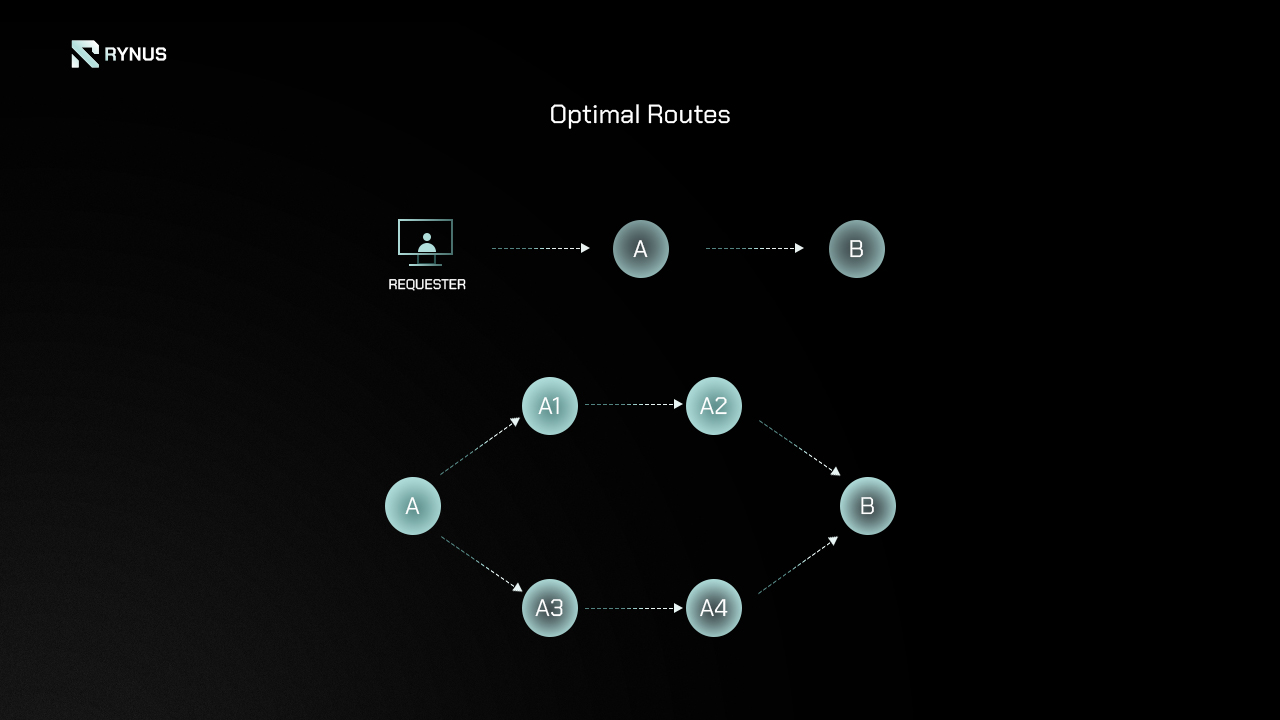
6. Peer-to-peer Transfer
Rynus also develops a Peer-to-peer (P2P) file transfer between Workers, allowing transferring files directly between multiple Workers in the Rynus network. The nodes can communicate and exchange data directly, efficiently utilizing network resources to speed up the file transfer process.
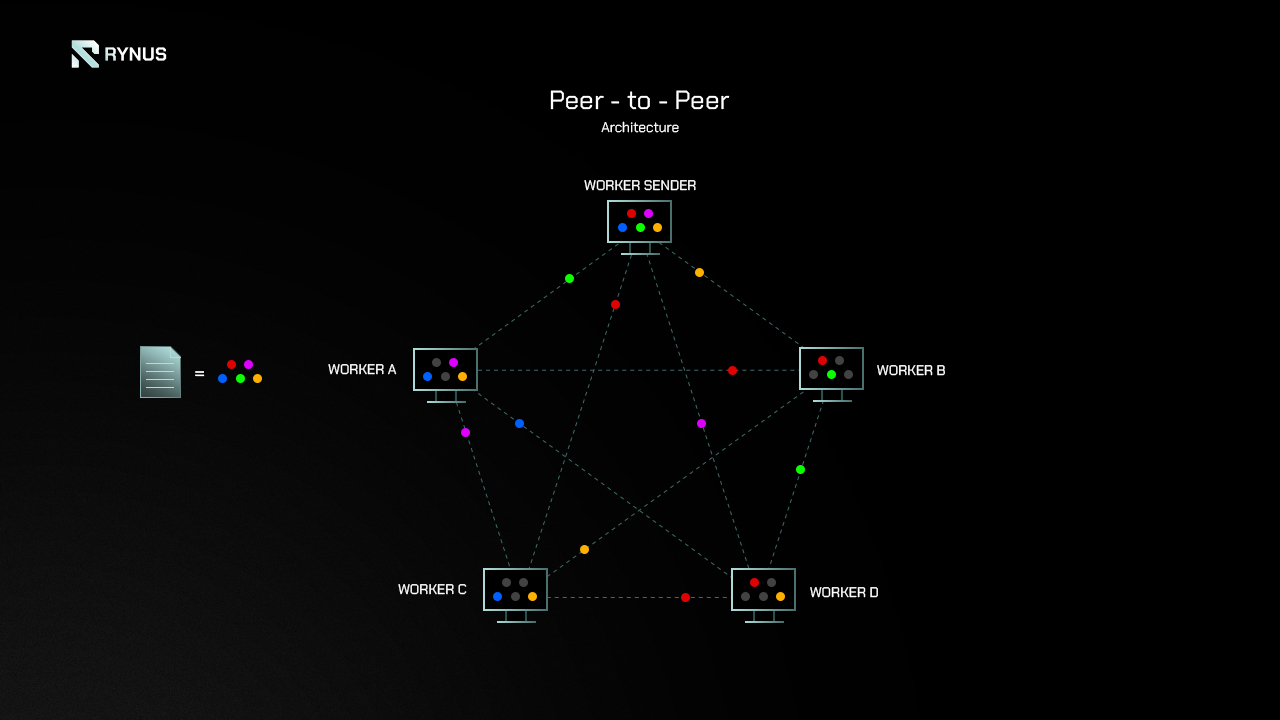
GPU Diversity and Affordability
Rynus offers a wide range of GPU options, including NVIDIA, AMD, Apple, and Intel. This enables Requesters to choose GPUs tailored to the specific requirements of their AI training projects.
Cost-effectiveness is another benefit of Rynus, offering prices up to 80% lower than traditional centralized platforms. Additionally, Rynus features multiple price tiers, allowing Requesters to select a pricing plan that aligns with their budget and computational needs.
This combination of diversity and affordability ensures that Rynus can cater to a wide range of users, from startups and individual developers to large-scale enterprises, making high-performance AI infrastructure accessible to all.
Decentralized Pricing Model
Rynus achieves its cost advantage of up to 80% lower prices through a unique decentralized pricing model. Unlike traditional cloud computing platforms where service providers dictate fixed costs, Rynus allows GPU providers, known as Workers, to bid for computing jobs and set their own prices.
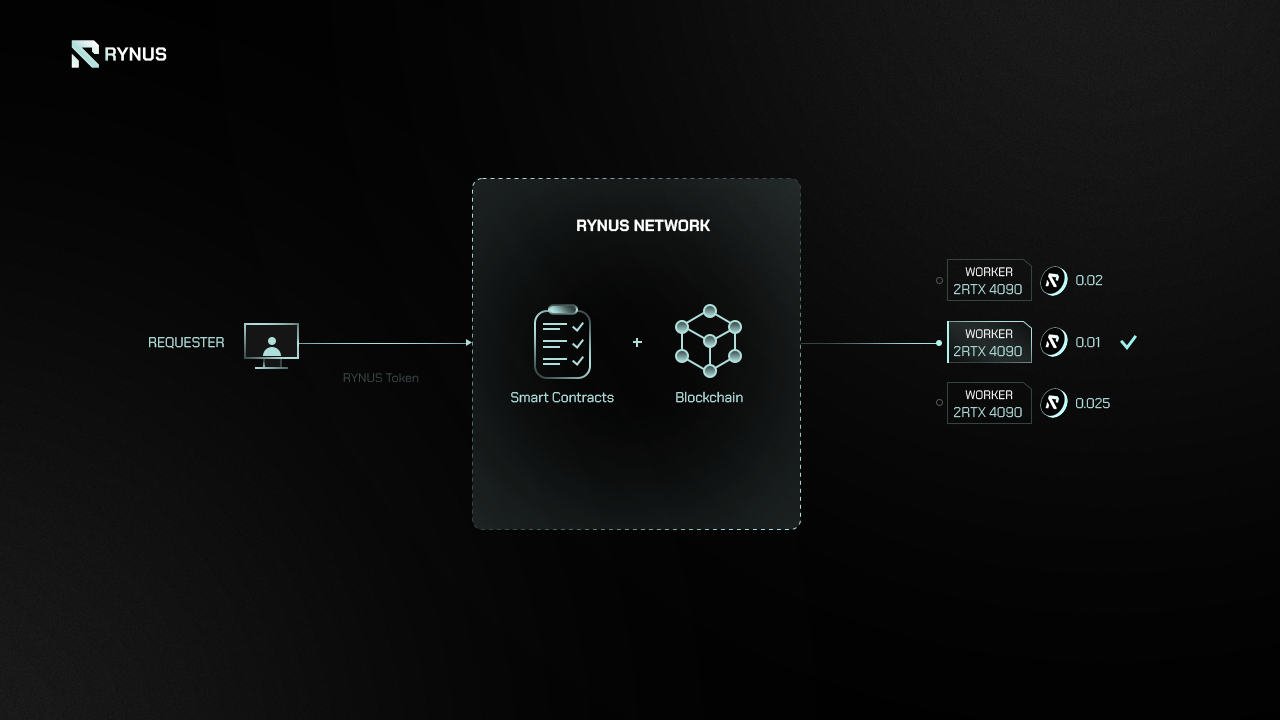
By enabling Workers to control pricing, the rental cost of GPU on Rynus fluctuates based on current market conditions, ensuring a transparent, equitable, and competitive pricing structure. This decentralized model empowers participants, fosters a democratic ecosystem, and eliminates monopolistic pricing often seen in centralized platforms.
Through this system, Rynus not only reduces costs for Requesters but also enhances freedom and fairness for Workers, aligning with the principles of decentralization and creating a truly user-driven cloud computing network.
Extensive Experience and Case Studies
Rynus builds on a solid foundation of over five years of expertise in delivering centralized computing products and services. During this time, we have successfully processed millions of AI training jobs for a diverse range of clients, earning trust and recognition for our reliability and performance. Additionally, we have developed comprehensive case studies and pipelines tailored for specific AI training use cases.
Rynus ensures that our decentralized network inherits the same level of professionalism and technical excellence, offering users a platform backed by real-world success and expertise.
Tier III Data Center
Rynus operates a Tier III-certified Data Center, adhering to the rigorous standards set by the Uptime Institute. This certification ensures 99.99% uptime, providing exceptional reliability and uninterrupted service. Additionally, the Data Center complies with other critical standards, including Operation, Quality Management Standards, Information Security Standards, and Energy Management Standards.
Our Local Workers within the Data Center deliver consistent and reliable computational power, ensuring seamless service availability even before Global Workers join the network.
Platform Compatibility
The AI/ML landscape is fragmented, with enterprises and individuals relying on diverse pipelines and preferred platforms. Rynus bridges this gap by offering comprehensive compatibility across all major AI platforms, ensuring a seamless and flexible user experience.
For AI Training, Rynus supports the building, training, and tuning of AI, Machine Learning, and Deep Learning models using a wide range of AI frameworks and libraries, including TensorFlow, Jupyter, Anaconda, Python, PyTorch, MXNet, Keras, CNTK, Caffe, and more.
For Data Labeling, Rynus supports labeling across all data types, including image, text, audio, video, and beyond, catering to the diverse needs of AI projects.
Privacy and Security
Rynus adopts new security technologies and ensures the data security of our users with multiple layers of protection.
1. Data Center Tier III
Rynus Data Center Tier III includes both physical security and data security.
- Physical Security: Our Tier III data centers incorporate robust security features such as fences, gates, and security cameras to protect the facility. Additionally, these data centers are strategically located in safe regions to mitigate the risk of natural disasters. The infrastructure is specifically designed to endure events like earthquakes, floods, and fires, ensuring uninterrupted service.
- Data Security: To safeguard consumer data, our Tier III data centers deploy advanced security mechanisms including encryption, firewalls, and intrusion detection systems. These measures are crucial in preventing unauthorized access and ensuring the integrity and confidentiality of sensitive information.
2. Two-Factor Authentication
Two-factor authentication is integrated when logging in to the Rynus Cloud and Transfer application.
3. Secure Sockets Layer (SSL)
SSL certificates are integrated into the Rynus Cloud, REST APIs, and backend services.
4. Secure File Transfer Protocol (SFTP)
Files are transferred to Rynus server using the Transfer application via SFTP.
5. Server-Side and Client-Side Encryption
Server-side and Client-side encryption is integrated into REST APIs to encrypt data being transmitted.
6. AES and RSA Encryption
AES and RSA encryption algorithms are applied across the entire system, including end-user apps and backend services.
7. End-to-End Encryption (E2EE)
End-to-end encryption is integrated into the Worker application and backend Worker manager.
Profit-Optimized Workers
Rynus empowers Workers to maximize their earning potential by contributing idle GPUs and participating in data labeling tasks.
For GPU Workers, Rynus introduces a profit-optimized system designed to ensure continuous revenue generation. When GPU Workers are not processing AI training jobs, they seamlessly switch to coin mining during idle periods, optimizing resource utilization and earnings.
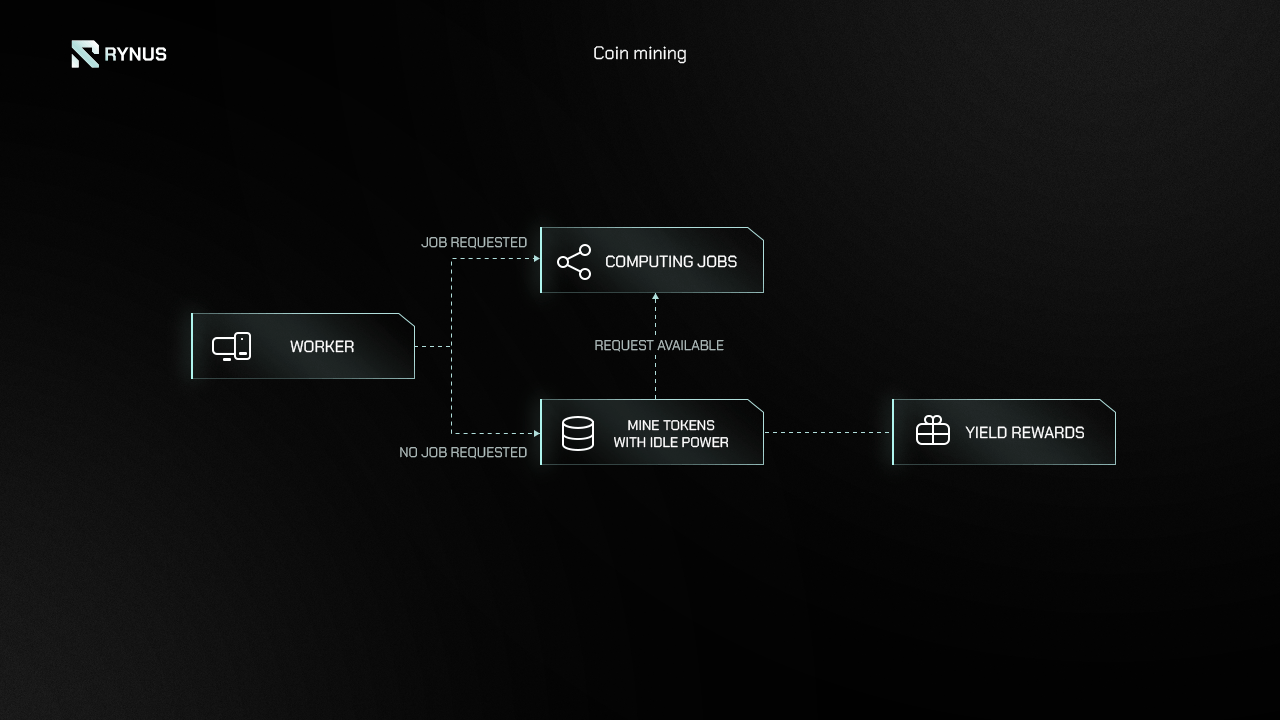
Coin Mining Integration: One-click deployment to yield extra rewards
Solana Blockchain
Rynus leverages the Solana blockchain for its decentralized platform, integrating a Proof-of-Compute system to validate and reward computational contributions.
Requesters use Rynus Tokens, built on Solana blockchain, to pay Workers for completing tasks such as training AI models and labeling data. The Solana blockchain ensures the transparency and security of all transactions, with tokens that can be stored in any Solana-compatible wallet and traded on supported exchanges.
The Proof-of-Compute system records verifiable proof of completed computations directly on the blockchain. This system certifies that Workers have successfully fulfilled tasks, such as training AI models or labeling data, ensuring the results meet the Requesters’ requirements. Once verified, Workers are rewarded with Rynus Tokens, creating a trustworthy and decentralized mechanism for validating work and distributing rewards.
Superior Transaction Speed
In blockchain technology, Transactions Per Second (TPS) measures the maximum number of transactions a network can process within a second. For comparison, Bitcoin handles approximately 7 TPS, Ethereum 1.0 manages around 30 TPS, while Solana far surpasses them with a theoretical maximum speed of 65,000 TPS.
As one of the fastest large blockchains, Solana offers unparalleled transaction processing speed. Rynus integrates Solana to leverage this exceptional performance, enabling swift and efficient handling of transactions across the platform.